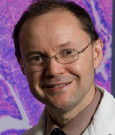In a new study,1 more precise estimates of age-associated risks of gastric and breast cancer were derived for carriers of the CDH1 gene mutation, a cancer-predisposing gene that is abnormal in families meeting criteria for clinically defined hereditary diffuse gastric cancer (HDGC).
David G. Huntsman, MD, of the British Columbia Cancer Agency, and colleagues tested for CDH1 germline mutations in 183 new families with HDGC. Penetrance (the proportion of people with a gene mutation who will show clinical disease) was derived from 75 mutation-positive families from this and other study groups, comprising 3,858 individuals. Germline DNA from 144 HDGC families without the CDH1 mutations also was screened for 55 cancer-associated genes, to determine if other genes are associated with HDGC.
The authors identified 31 distinct CDH1 mutations in 34 of 183 families (19%). They estimate that by age 80, the cumulative incidence of gastric cancer is 70% for men and 56% for women, with a risk of breast cancer for women of 42%. They also identified candidate mutations in 16 of 144 probands (the person who is the starting point in a family being studied).
“These data should assist in the genetic counseling and management of at-risk individuals from CDH1-positive HDGC families,” the study concludes.
‘Major Advance’
In a related editorial,2 James M. Ford, MD, of the Stanford University School of Medicine, said, “The study by Dr. Huntsman and colleagues assembles the largest group of genetically defined HDGC families to date (75 families, comprising 3,858 individuals) to determine age-specific penetrance of gastric and breast cancer. These updated risk assessments should be considered the new standard for genetic counseling, and will be included in the next International Gastric Cancer Linkage Consortium guidelines.… The study provides a major advance. Further clinical and genetic research is necessary to identify more biomarkers and better methods of screening individuals at high risk,” he concluded. ■
References
1. Hansford S, Kaurah P, Li-Chang H, et al: Hereditary diffuse gastric cancer syndrome. JAMA Oncol. February 12, 2015 (early release online).
2. Ford JM: Hereditary gastric cancer. JAMA Oncol. February 12, 2015 (early release online).



